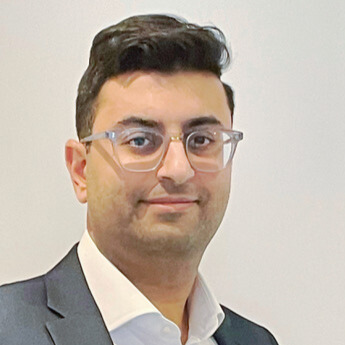
Nikunj Davda
Fellow in Clinical AI, Cohort 2
Fellowship Bio
I am a neurologist interested in innovation, service development and medical education. I am particularly interested in how multimodal (including digital) data can be used for diagnosis and prognostication.
Fellowship Project
MIDI (MR Imaging abnormality deep learning identification) Feasibility Study
King’s College Hospital NHS Foundation Trust
My project involves designing and leading a multi-site feasibility study to obtain clinical evidence for a neuroimaging AI tool that analyses MRI scans. The tool was trained by employing a transformer based LLM and a convolutional neural network and determines the presence/absence of any cranial abnormalities. During the last 12 months, I wrote a protocol, designed a dataflow pathway, created a clinical workflow for the study and worked with industry partners to integrate the software with existing hospital imaging systems. The aims of the study were to assess whether the AI software can be integrated into a clinical pathway; assess the performance of the tool against a human gold standard; assess (as a secondary outcome measure) whether the tool improves scan reporting efficiency; and finally, to assess usability. To assess feasibility and performance, I co-ordinated with three trusts (including two large London hospitals and one smaller peripheral district general hospital) to organise local integration and set up. This work is ongoing. To assess efficiency, I ran a sub-study recruiting 10 consultant neuroradiologists to report a list of scans with and without the AI. This is due to complete shortly and I have some early results. To assess usability, I performed a literature review on AI usability studies and incorporated international standards to design our own mixed methods usability study including questions and interviews which will be administered at the end of the whole study. My role has involved study design; risk/hazard assessment and mitigation; clinical workflow design, performance assessment and addressing numerous factors relating to technical and clinical interoperability, usability, explainability and the human-AI interface. I have interviewed clinicians on our explainability metrics, helping to iterate the way in which our AI output is presented; and have authored several documents related to my study to maintain a technical file as part of our quality management system.
Fellowship Testimonial
This fellowship has been a wonderful opportunity to be part of a group of talented and knowledgeable clinicians interested in AI, from whom I have learnt so much during the year. The monthly workshops have covered a breath of topics with research, clinical and commercial themed talks, which together have given us a well-rounded education of the current state and potential use of AI in healthcare; as well as providing us with useful skills and approaches in developing and deploying AI for patient care. The speakers and choice of topics have been excellent. Being given ownership of (and autonomy in), designing and running my own AI product validation study has been a hugely educational experience and given me a first hand, lived appreciation, of the many commonly discussed topics in developing and deploying AI software, with issues ranging from explainability, ethics, regulation, clinical validity and interoperability. This has given me an understanding of the issues, challenges and requirements of integrating AI into clinical care and I am grateful to my project supervisor, Dr Thomas Booth for his mentorship and support. The foundational knowledge that I gained in completing this fellowship allowed me to take up opportunities such as advising health-tech companies and consulting firms which have also been valuable learning experiences. The programme has provided me with a good base of work to enable me to apply (and be accepted) for further funding opportunities such as the Topol fellowship which will allow me to continue with, and expand on, my current work. This would not have been possible without this programme. I am grateful to the course organisers and the other fellows for this valuable experience.